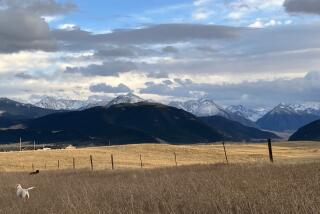Little tale of the prairie
- Share via
IF apple pie hadn’t gotten there first, might we all be saying, “as American as a one-room schoolhouse”? Although other countries have their analogous cabins of learning (not to mention desserts), the platonic ideal of the one-room schoolhouse seems to encompass a mansion’s worth of American history and values: sod-busting pioneer spirit, making do with what you have, ingenuity, grass-roots democracy, public education, Rockwellian high jinks in the schoolyard, gingham and pigtails, short pants and slingshots. This iconic institution forms part of the nation’s collective memory, even if most of the population has never seen the inside of one.
Now, because a classic schoolhouse figures as the true hero in Ivan Doig’s new novel, “The Whistling Season,” readers can step inside one, warm their hands at the coal stove, sniff the chalk and floor wax and sit a spell at the oak double desks lined up in eight rows for eight grades.
Arguably, such a leitmotif could easily drown in cliche and sentimentality. But along with his much praised, incantatory gifts for evoking quintessentially American prairie life and history, the National Book Award finalist brings to a rather simple and foreseeable plotline a bushel and peck of irresistible characters, each so full of spunk, wit, ambition or sheer orneriness that not one of them will lie down on the page and sleep for a moment.
Sleep, or the lack of it, is an abiding concern for the narrator, Paul Milliron, who is 13 in 1909 as the novel opens in the wind-swept dryland farming community of Marias Coulee, Mont. A year earlier, his father, Oliver (homesteader, hauler for a massive irrigation dig, father of three and head of the school board), lost his young wife to appendicitis. In the benumbed, now all-male household, Oliver has his hands more than full. As Paul, the oldest son, recalls: “I thought of it as like the cauterizing I had read about Civil War doctors doing when they performed amputations, the fierce burn sealing off the wound.” The only loss they mourn aloud is that of decently cooked meals and “regular upkeep.... If anything, we practiced downkeep.” It is small wonder that nightmares, sleepwalking fits and “indelible dreams” that “stay with me like annals of the Arabian Nights” leave Paul hollow-eyed come morning.
“Can’t Cook but Doesn’t Bite.” So begins the employment request of a housekeeper strangely keen to quit civilized Minneapolis for the wilds of Montana. Despite her caveat, widow Rose Llewellyn is invited and accepts, alighting at the train depot with a series of surprises for the Millirons: her youth and prettiness, a gamine frame in chic apparel (“Minneapolis did not lack for satin”), a demand for an immediate advance on wages and, above all, a dapper, mustachioed companion, whom she introduces as her unshakably devoted brother Morris Morgan. Although the Millirons are perplexingly loath to pose many questions, there’s clearly some mystery afoot here. “Morrie” turns out to be a fountain of entertaining erudition, and when the local teacher elopes with a traveling revivalist preacher, he takes over not only the one-room schoolhouse, but center stage in the novel as well.
Mountebank, polymath or both, Morrie is a beguiling, prismatic character. His florid yet perfectly precise speech thoroughly one-ups Oliver Milliron’s penchant for pedantic locutions: Morrie calls the rattlesnake placed under the schoolhouse by a vengeful enemy a “[r]emarkable jest of nature ... the creature carrying toxin at one end and a tocsin at the other.” And Doig offers some amazing nuggets, including the origin of the measure “yard” (hint: Robin Hood) and the history of Halley’s comet, due to swoop over Marias Coulee come spring.
With Montana known as “Big Sky Country,” it is fitting that celestial goings-on play a role in this paean to prairie life. The comet’s 76-year cycle bracketed the life and death of Mark Twain, to whom Doig pays direct homage with the novel’s wry comedy and love of classic Americana. Both elegiac and life-affirming, “The Whistling Season” takes the chill out of today’s literary winds. *
More to Read
Sign up for our Book Club newsletter
Get the latest news, events and more from the Los Angeles Times Book Club, and help us get L.A. reading and talking.
You may occasionally receive promotional content from the Los Angeles Times.







